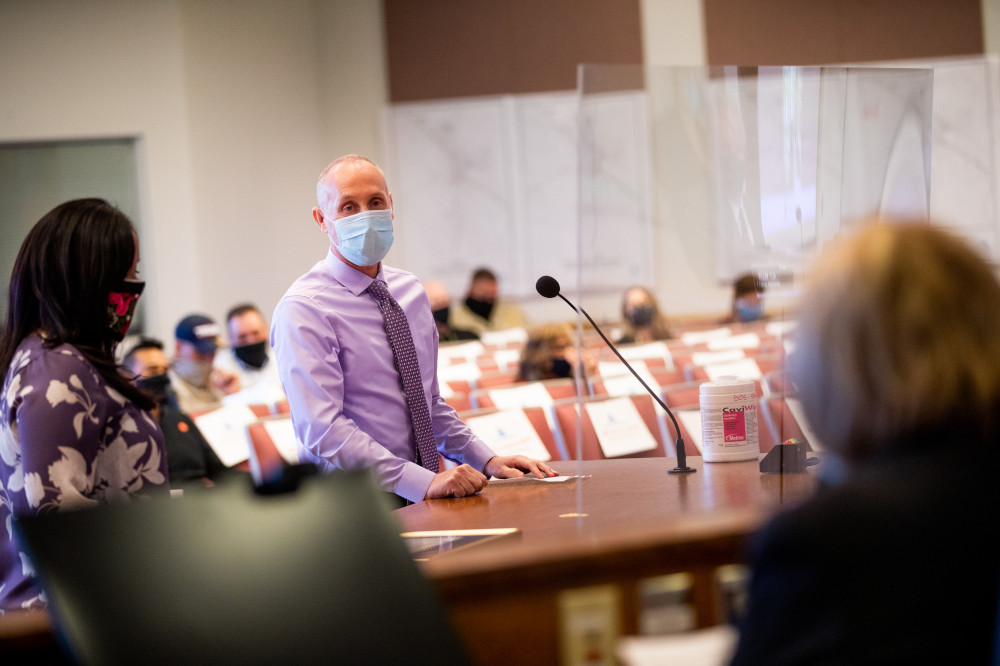Reaching them where they are: ‘MC3’ delivered equity in COVID-19 services
It was early November 2021. COVID-19 cases were on the rise, soon to spike. Pastor Fabian Chidandali prepared a special sermon that day for the congregation at Agape, a southside church that provides a home to the Bethesda African Fellowship.
He warned the vaccine-hesitant congregation of African refugees about the dangers of COVID-19 for them, their families and their community, urging all to get the vaccine.
And then his actions spoke as loud as his words.
Chidandali, after the service, was first in line to receive a COVID-19 shot, the best protection against illness, hospitalization and death from the virus.
Pima County administered 87 more vaccines that day at Agape.
“As a leader,” Chidandali said, “you have to set an example.”
The vaccination clinic that day at Agape was part of a larger, successful targeted effort through a Pima County Health Department grant-funded program called “Mitigating the Impact of COVID-19 in Communities of Color.” To the public health workers who carried out its mission, the program was better known by its unofficial nickname “MC3.”
Data shows that communities of color, especially refugee and immigrant communities, faced disproportionate impacts from the pandemic. These communities faced both a higher risk of becoming infected with COVID-19, and a higher risk of dying from the virus if infected.
To address this inequity, the Pima County Health Department began working in September of 2020 with the International Rescue Committee (IRC) on a program focused specifically on addressing COVID in these communities. The MC3 program was funded by federal CARES Act dollars via a grant through the Arizona Department of Health Services.
The goal of MC3 was to provide COVID-19 testing, vaccination, rapid response care coordination, and case management services for underserved communities in Pima County.
MC3 often leaned on trusted messengers, such as Pastor Chidandali, to address the seriousness of the pandemic, counter misinformation and to encourage the safest practices, such as getting tested and vaccinated.
Three Sundays later, the MC3 team returned to Agape to administer 65 more vaccines. Reflecting on the MC3 vaccination events at his church several months later, Chidandali estimated that most of his congregation had become fully vaccinated.
Chidandali, a refugee himself, is from the Democratic Republic of Congo, a central African nation ravaged by decades of civil war. He says his local congregation currently has about 50 members from a number of different African countries, including Ghana, Togo, Kenya, Togo, Cameroon, and Sudan.
Chidandali said vaccine hesitancy in his community involves factors invisible to much of the larger population, like language barriers. He said members of his church natively speak languages like Swahili and sometimes French, but often neither English nor Spanish. Many who have young children rely on their kids to translate between English and their native languages.
“They might not want to, you know … go to the Wal-Mart,” he said of trying to get a vaccine appointment. “Or they might try to go to the Wal-Mart, and they get told they need to have an appointment, that they must come back tomorrow,” said Chidandali.
“That’s why I involved IRC. To reach those people where they are.”
That was MC3’s mission: Reach people where they are. MC3 took pains to operate free mobile clinics in places where these communities felt safe. These included churches, schools, community centers, and even apartment complexes. Although much of the program’s work took place in Tucson, MC3 held events throughout Pima County, in places as far-flung as Robles Junction, Arivaca, and Sells.
“We would work with the IRC and go wherever the need was,” said Diego Bernal, a health department staffer who worked on MC3. He explained that the IRC would help the department to identify optimal locations where services like testing and vaccinations could be made available to communities of immigrants and refugees.
Among the program goals was to test 2,000 people for COVID-19 from September 2020 through February 2022. The program went far beyond, testing 9,869 across 75 sites. MC3 delivered 21,227 COVID-19 shots at 51 locations.
The MC3 program was nationally recognized by the National Association of County and City Health Officials (NACCHO) for the 2021 Innovative Practice in recognition of “programs developed in response to the COVID-19 pandemic demonstrating effective community partnerships and collaboration, adaptability and program resilience, and remarkable innovation.” Out of 76 local health departments nationwide, MC3 was one of eight gold-award winning programs.
Pima County’s efforts to mitigate COVID-19 have stacked up well against the rest of Arizona, as well as much of the U.S. Behind these statistics has been an approach to the pandemic that focused special attention on the most vulnerable.
“The MC3 program has expired, but the Health Department has an unwavering commitment to continue focusing on health equity through all of its programs,” Bernal said. “We’re proud that MC3 was able to help blaze this trail to serve Pima County.”
Sorry, the comment form is closed at this time.



